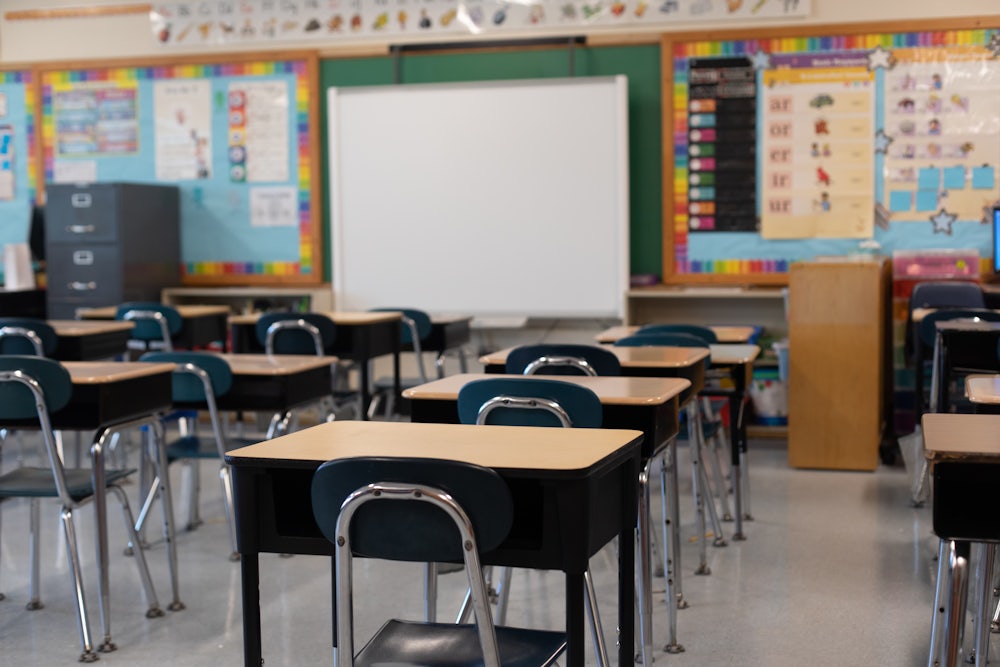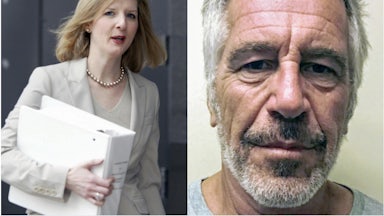When Rosalyn Sandri returned to teach English at her high school alma mater, she never imagined it would end in a forced resignation. Only three years after stepping into her Texas classroom, she walked out of it for the last time. She’d never see her students again.
“They didn’t even let me say goodbye,” she said.
The week before her dismissal had been unremarkable—long days spent grading essays and assigning homework. In September 2024, Sandri, 33, had started publicly transitioning as a transgender woman, something she said her fellow teachers and students welcomed kindly. She shared her journey on TikTok, including one video documenting the euphoria of being called “ma’am” for the first time.
But while her vlog resonated with trans students, it also attracted the attention of Libs of TikTok, a far-right and anti-LGBT social media account known for spreading transphobic hate. It pinned the video to its profile, asking, “Would you feel comfortable with this person teaching your kid?” Over five million people viewed the video, and the waves of hate rolled in immediately. Some commenters joked about putting a bullet in her head. Her state representative called for her termination.
“I do not want anybody in a classroom in a position of authority teaching children that boys can be girls and girls can become boys,” Representative Brian Harrison said at the time.
South Carolina Representative Nancy Mace piled on, “Why is it allowed to be around children?”
Soon afterward, Sandri was handed resignation papers. Her career was over. Her crime? Being herself at the wrong time, in the wrong place, under the wrong administration.
Now, she finds herself somewhere she never anticipated: joining a growing wave of educators who are either quitting the profession altogether or leaving the states they once called home behind.
“I am broke,” she said. “I don’t have the money to just pick up and move again, so I’m applying for relocation assistance. I’m looking at things like Canada’s visa program for teachers.”
“If that doesn’t work out and I stay here, my teaching career is over,” she added. “I’m going to try to find something else to do and transfer out of teaching. And that breaks my heart, because teaching is all I wanted to do since I was five. But now there’s a mark on my teaching certificate that says I’ve been investigated for misconduct. So nobody’s going to hire me here.”
In an increasingly conservative America, more teachers are finding themselves in similar situations. And more school systems are discovering that there are fewer people who want to subject themselves to the capricious nature of right-wing abuse. In the last school year, schools opened with an estimated 55,000 teaching vacancies, up from 36,000 in the year prior. More than 270,000 classrooms were staffed by individuals without full credentials. States like Utah, Nevada, Alabama, Louisiana, and Florida were the hardest hit, with Arizona leading at less than 44 teachers per 1,000 students.
Gone are the days of eager new recruits, ready to leap into the classroom. Nationwide, 79 percent of public schools reported difficulty hiring teachers last year.
Texas has also borne the brunt of this trend. Between fall 2021 and fall 2022, the state saw a record 13.4 percent attrition rate, and the proportion of newly hired teachers without a state-sanctioned certification or permit in the following school year rose to nearly 30 percent. In May, Governor Greg Abbott signed a law requiring the Ten Commandments to be posted in all classrooms.
And while low pay and job burnout remain key factors in their decision to quit the profession, teachers say they’re also simply afraid. Since President Donald Trump’s return to office, the Department of Education has launched an aggressive campaign against diversity, equity, and inclusion, or DEI, including targeted attacks on queer teachers. One executive order, “Ending Radical Indoctrination in K-12 Schooling,” urges law enforcement to investigate anyone promoting “radical gender ideology.”
“Some will leave the profession, others will leave and move elsewhere,” said Sandri. “But I think the bigger danger is that a lot of them are going to get beaten to submission because they don’t want to lose their jobs.”
Many are already reaching that point. In a popular Reddit thread r/ELATeachers, dozens of pseudonymous educators expressed their fears. “I’m out. I can’t be in a place where my existence is a political statement,” commented one.
The panic is sweeping the South. “We’ve had several teachers leave over the grooming accusations,” said Sherry East, president of the South Carolina Education Association. “Several librarians have quit their jobs. An English teacher also quit outright. He was like, ‘I’m not going to be accused of doing this kind of stuff. I’m just trying to teach.’”
Angry social media users and far-right critics have called these and other teachers groomers and pedophiles. Others have doxed them online. But East said that some of the most concerning reactions come from the politicans themselves. “People are spending millions of dollars to get elected to a school board race so they can ban a book. One teacher’s name and picture ended up on the back of a political mailer: ‘This teacher promotes communism.’”
All school districts have opt-out forms if parents want to prevent their child from reading something, said East. “But that’s not enough. Instead, they want to enforce their own family’s rules onto other families, which feels like the opposite of freedom and liberty.”
Statewide book bans, looming ICE raids, hostile new curriculums, and what she calls “political warfare” have created an atmosphere of terror.
“We don’t make enough money to put up with this,” she said. “We don’t make enough money to be accused of the things they’re accusing us of. So we’re out.”
In West Virginia, the fear is financial. “There’s a fear among educators … with the suggestion to cut the Department of Education, which could cut funding for West Virginia,” said Dale Lee, president of the West Virginia Education Association. “Fifty-three percent of our schools are Title 1 schools, which means low economic schools,” he continued. “For many of our students, the only hot meals that they get are in school.”
But when kids need support most, the teachers that once provided it are gone.
“Some are leaving to the surrounding states for the pay, and some are leaving the profession altogether due to lack of respect,” he said, adding that West Virginia, too, has drastically high shortages. “Teachers are the experts in public education. Every teacher knows what their kids need. Every classroom is different. You can’t do a one-size-fits-all for a better education.”
Teacher departures are fundamentally reshaping how kids learn, they say. As educators relocate across state lines or even abroad to find professional environments free from political persecution, it’s the students who suffer the most.
For Mary Foster, an early childhood educator and mother of a trans son, the attacks are just growing worse. “We’ve been referred to as porn pushers,” she said of her work with Families Against Book Bans. “We’ve had death threats, threats to our families. It’s unreal, only it’s real. And I’ve seen it firsthand.”
Last year, 10,000 books were banned from public schools across America, triple the number compared to 2023. The Pentagon has also issued a list of books to be pulled from Department of Defense schools, including lessons on gender and sexuality and immigration. Actress Julianne Moore’s book, Freckleface Strawberry, is about a young girl learning to “love the skin she’s in.” That, of course, was also banned.
Foster said many of the 21 banned books in South Carolina feature strong female protagonists or address sexual abuse. “The state’s not comfortable with young adults knowing what consent is and isn’t,” she said. “That’s terrifying to me.”
And many educators are preemptively censoring themselves.
“If I were a brand-new teacher right now in this environment, I would be so afraid to say anything,” Foster said. “Unfortunately, a lot of the parents who are pushing back on educators are doing it in a very threatening, menacing way. So what’s happening now is silent censorship. Books and stories just vanish from classrooms before anyone files a complaint. People want to avoid becoming the next target.”
Foster said she’s heard it all. “I had a librarian tell me that she was asked to remove a book about the slave trade. It was taking a toll on her health to be so concerned and to be overthinking every book that she placed. She resigned at the end of the year. And she moved out of state,” she said. “It has been really traumatic for a lot of teachers who spend so much time doing all they can to serve every student they teach.”
While Foster said “courage is required” during trying times, “I absolutely understand that people depend on their income for their livelihood, that not every family has the privilege I have to feel safe.”
The fear, however, is palpable for those still in the classroom. April Jones, a veteran Texas teacher, has worried about her own job stability. She was reprimanded for a classroom sign that read, “Hate Has No Home Here.” She’d had it up for 10 years, but in August 2024, a parent complained. Administrators flagged the rainbow pride heart and multicolored fists on the sign as “political.”
Things only got worse after Trump’s win.
“Nobody could give me a straight answer,” she said. “What political party is a rainbow heart supposed to represent?”
Jones says she’s constantly on edge. “A student might ask a question about LGBTQ issues, and I shut it down like I’m supposed to. But if another kid tells their parent, then suddenly I’m accused of indoctrination. I just wanted to teach. Now it feels like there’s a laundry list of things I can’t say.”
For teachers like Jones, it’s no longer a question of if they’ll leave, but when. “I know a lot of teachers are like, ‘I’ll give it one more year.’ But a lot more of us are migrating,” she said. “Especially now.”
The decision haunts her.
“If I don’t stay and advocate for students, then who will?” she asked. “But that only lasts so long. At some point, you have to take care of yourself.”
Jon Bonham, a Black English teacher and coach in Texas, said that this year feels different from Trump’s first win. “Even back then, there was a line people didn’t cross. Now they’ve been emboldened.”
He’s had parents complain about him teaching Black poets. Students now wear MAGA hats and say racial slurs in the hallways. “There’s no accountability anymore,” he said. “I come home with trauma every day. I’m pouring from an empty bucket.”
Bonham considered leaving the country altogether. “I thought about moving from teaching in this public education system to go abroad,” he said. “I was really thinking about it hard, and then, unfortunately, my spouse had a medical situation that sent them into a coma. That was a month after losing my own son to suicide.”
It was the turning point that kept him from relocating. Now his priority is showing up at home more than the classroom. “I would lay down my life for these kids,” he added. “But should I ever have to be prepared to do that? Hell no.”
Whether teachers leave the classroom or cross state lines, schools across the country are being hollowed out. The cost of staying is growing higher. And the list of those who can afford to remain is getting shorter.
As for Sandri, she isn’t sure what her next step will be. But her future in education feels bleak. “I think another state might provide me refuge momentarily, but I don’t think the way things are currently that anybody can provide permanent protection in any way,” she said. “Sure, I’ll move to Rhode Island, or I’ll move to Boston, where they say they’re a sanctuary city for trans people.
She paused. “But for how long?”










